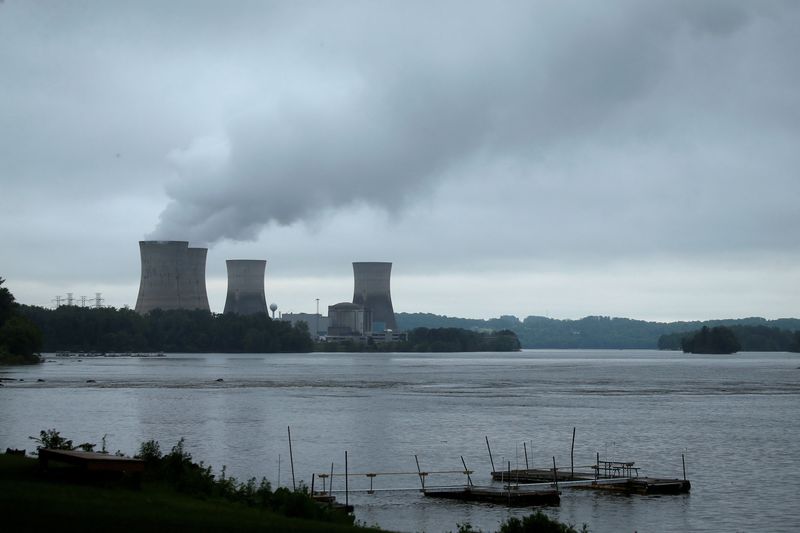By Laila Kearney and Timothy Gardner
NEW YORK/WASHINGTON (Reuters) - A plan by Microsoft (NASDAQ:MSFT) to use the restart of a Three Mile Island nuclear reactor to help power its expanding data centers reflects the tech industry's hopes nuclear energy can be a quick and climate-friendly answer to its massive electricity needs.
But it will be tough to swiftly meet soaring power demand from the data centers behind artificial intelligence with new or resurrected nuclear reactors, as companies will face high regulatory hurdles, potential fuel supply obstacles, and sometimes stiff local and environmental opposition.
Microsoft and Constellation Energy announced a deal to restart a unit at the plant in Pennsylvania on Friday, in what would be the first-ever restart for a data center.
At the announcement, Constellation’s CEO Joe Dominguez called nuclear power the only energy source available that is both climate-friendly and reliable enough to support Big Tech’s needs, implying weather-dependent wind and solar energy may not be up to the task.
The announcement follows a similar agreement in March in which Amazon.com (NASDAQ:AMZN) purchased a nuclear-powered datacenter from Talen Energy (O:TLN), and other nuclear contracts for data centers are in the works, power industry sources say.
The needs these deals aim to fill are huge.
U.S. data center power use is expected to roughly triple between 2023 and 2030 and will require about 47 gigawatts of new generation capacity, according to Goldman Sachs (NYSE:GS) estimates, which assumed natural gas, wind and solar would fill the gap.
Climate conscious investors and regulators are keen to ensure this spike does not trigger a huge rise in greenhouse gas emissions.
For Microsoft and Constellation, at least, the deal is likely to be challenging to bring to fruition.
"Nobody has done this before," said Kate Fowler, global nuclear energy leader for Marsh, an energy insurance broker and risk advisor, about Three Mile Island's attempted restart. "There's going to be challenges that pop up."
The Three Mile Island plant made global headlines in 1979 with a partial meltdown at its Unit 2 reactor, the worst nuclear incident in US history.
The reopening plan covers the Unit 1 reactor at the Pennsylvania plant, which operated safely for decades before being closed five years ago. The $1.6-billion plan would restart Unit 1 by 2028 to offset Microsoft's data-center power consumption in the region.
But key permits for the plant's new life have not yet been filed, regulators say.
Getting them could be hard, especially against local opponents who remember the 1979 partial meltdown.
Resuming the use of equipment and infrastructure that has been dormant for five years could also be tricky, said Edwin Lyman, a nuclear safety expert at the Union of Concerned Scientists.
"Constellation should expect to encounter problems that will be costly and time-consuming to fix," Lyman said.
Three Mile Island also will require modified surface and groundwater permits, said Stacey Hanrahan, a spokesperson for the Susquehanna River Basin Commission.
"Any modification request will be thoroughly reviewed, and the project's expected water demands will be evaluated for sustainability and potential adverse impacts to the environment and other users," Hanrahan said.
OTHER HURDLES
There are broader issues that could affect any number of other attempted tech-nuclear link ups in the U.S.
For instance, Washington slapped restrictions on enriched uranium imports following Russia's 2022 full-scale invasion of Ukraine.
Securing licenses from the U.S. Nuclear Regulatory Commission could also be tricky for any nuclear project.
"The NRC currently really has a full plate," said Sola Talabi, a nuclear engineer and president of energy risk consultancy Pittsburgh Technical, noting license applications for different types of reactors the agency has never considered before, including high-tech modular plants and the restart of another decommissioned reactor.
Even though President Joe Biden recently signed legislation to streamline the NRC's licensing process, consideration of the queue of new projects by the timelines laid out by companies will challenge NRC personnel and technical resources, Talabi said.
For the Talen project, pocketbook issues have become a problem. Even though the plant is operating, Amazon's data center there faces challenges on the federal level from two regulated utilities who predict it could increase transmission costs that would raise power bills.
Talen disputes the prediction that the public would face higher power bills or reliability problems from the data center, which could consume enough electricity to power all the homes in New Mexico.
In general, simply purchasing power from nuclear plants to run data centers just means diverting it away from other consumers, creating competition for supplies on the grid that could potentially drive up power bills.
In the meantime, the Three Mile Island project is posing a major test of public appetite for expanded nuclear power.

Talabi said four years is likely enough for Constellation to address any technical issues at Three Mile Island, which could be substantial when sensitive components such as steam generators and reactor vessels have been closed for years. But he emphasized the importance of handling environmental and community concerns that may arise around the site.
"Probably more than anywhere else in the country, the need for community engagement to ensure that we have societal acceptance is going to be critical for restart," Talabi said.